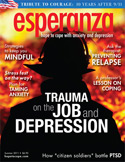
If you think mindfulness practice is all about sitting cross-legged and chanting like a monk, think again.
“Nobody sits and nobody chants,” Zindel V. Segal, PhD, says of the meditative techniques and exercises in the influential book he coauthored, The Mindful Way Through Depression: Freeing Yourself from Chronic Unhappiness. “In the course of our lives, there are ways to bring our attention into more present focus.”
“One of them is to become aware of our breath,” continues Segal, a professor of psychiatry at the University of Toronto and head of the Cognitive Behaviour Therapy Clinic at the Centre for Addiction and Mental Health. “When we’re in the car or standing in line at the bank, we can check in with our breathing, letting go of thoughts about the future and thoughts about the past. When we do that, it gives our attention an anchor. It helps to ground us.”
That seemingly simple breath exercise is not as easy as it sounds. To borrow a phrase, there’s a reason it’s called mindfulness practice, not mindfulness perfect. But with persistence, mindfulness techniques—meditative exercises that help your mind focus on the moment —can bring freedom from rumination, self-blame and negative thinking. More than that, cultivating mindfulness can improve your ability to face challenges with resilience and hope.
In simple terms, mindfulness is observation without judgment. Instead of trying to think our way out of a bad mood, which can wind up fueling negativity, a mindful approach simply notes with compassion what is happening in the mind and body.
Learning to step back and become an uncritical witness to our own thoughts and reactions can be challenging, however.
